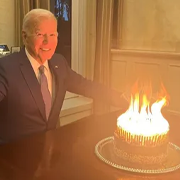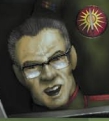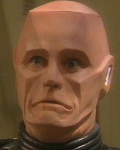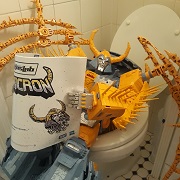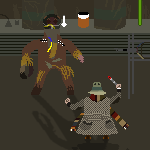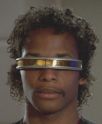|
Escobarbarian posted:This whole "Jerusalem reviews the actual episode, while Occ reviews a concept" thing is working out pretty good Thanks I really dig it  It's always good fun to read Lick expounding on a concept/theme he has picked up on during his watch, and if my covering most of the finer details of the plot frees him up to do more of that I'm more than pleased to do so.
|
|
|
|

|
| # ? May 2, 2024 00:38 |
|
Surprised neither of you mentioned the exchange near the start. "Slavery is still a thing." "... Yes, yes it is." Capaldi just perfectly sells that sadness and above all, disappointment with humanity. That stuck with me just as much as punching a racist in the face.
|
|
|
|
Another nice thing about this episode is it's underlying message that the British Empire was very explicitly a bad thing. The British Empire was poo poo. It was one of the worst things in human history. A shameless, staggering and utterly brutal exploitation of a full third of the planet. Far too much of Britain sanitises and glorifies it. A truly disgraceful number of us are still proud of it. Having one of the most popular things in the country, one that's also aimed at children, not just refuting that narrative but explicitly condemning it? It's incredibly welcome.
|
|
|
|
Captain Fargle posted:Another nice thing about this episode is it's underlying message that the British Empire was very explicitly a bad thing. The British Empire was poo poo. It was one of the worst things in human history. A shameless, staggering and utterly brutal exploitation of a full third of the planet. Far too much of Britain sanitises and glorifies it. A truly disgraceful number of us are still proud of it. In fairness that's because no one gets taught the lovely bits, and the government systematically tried to destroy the evidence as part of Operation Legacy. I remember being at school in the 80s and remember geography lessons often having a significant "that was ours but we gave it back" component to them, as though we'd magnanimously decided the natives were finally ready to live like civilised people and we graciously handed them the keys and bowed out. Of course with a bit more reading around the subject you quickly learn that "shoot the indigenous people, take their poo poo, split the country in half and gently caress off" isn't that magnanimous and is basically what we did as we travelled the world sticking flags in things.
|
|
|
|
Relevant quote from the episode, and possibly the line that ties it most closely to Beast Below outside of the premise:quote:But if your future is built on the suffering of that creature, what's your future worth?
|
|
|
|
Dabir posted:Capaldi just perfectly sells that sadness and above all, disappointment with humanity. That stuck with me just as much as punching a racist in the face. Yeah it's really drat good. I don't mean any disrespect to Tenant at all, but the glib dismissal of his Doctor to Martha's concerns was a real shame and it was nice to see it openly addressed here. To be fair, later in season 3 they did have Martha facing some of the nasty inherent racism of the time in the Family of Blood 2-parter and I was very pleased that they didn't make "John Smith" immune from it. 2house2fly posted:Relevant quote from the episode, and possibly the line that ties it most closely to Beast Below outside of the premise: Which reminds me of another thing I meant to note - while Bill is active in trying to save lives, I don't think it ever occurred to her that they should also be using the explosives to free the creature. That it was the Doctor who came up with that solution does feel like a slight missed opportunity, in the same way it would have been nice if Bill had been the one to catch the Vardy were experiencing more complex emotions in Smile.
|
|
|
|
https://www.youtube.com/watch?v=qQRWfxkCdU4
|
|
|
|
Jerusalem posted:Which reminds me of another thing I meant to note - while Bill is active in trying to save lives, I don't think it ever occurred to her that they should also be using the explosives to free the creature. That it was the Doctor who came up with that solution does feel like a slight missed opportunity, in the same way it would have been nice if Bill had been the one to catch the Vardy were experiencing more complex emotions in Smile. Bill being human-centric at this point makes perfect sense though. She's only human, and she acts like a human. The robots are malfunctioning industrial equipment that is killing people, the human thing to do is shut it down and then figure it out. The creature is a predator that has been eating people, and the human thing to do is kill any predator that has tasted human flesh. Bill didn't grow up next to a crack in the universe, she didn't spend 2000 years as a plastic soldier, she isn't The Girl Who Saves The Doctor. She's just a normal human who has had a handful of exceptional experiences.
|
|
|
|
While I agree, she has also shown a (really fun) predilection for approaching things from a slightly different perspective to most people, which is part of what attracted the Doctor to her. It's not a dealbreaker or anything, I just think it would have been neat if she had been the one to see things that weren't quite what they seemed, and help bring that perspective to the Doctor as well.
|
|
|
|
As another perspective on the "soft reboot" thing, I started watching with my girlfriend who had never seen an episode before. (I watched "The Pilot" while she was sick in bed and she enjoyed it.) I'll comment more as to its effectiveness later.
|
|
|
|
https://www.youtube.com/watch?v=455-CIgc7co i found the video you were looking for
|
|
|
|
Yeah you know what, I totally disagree with LTW's contention that making this a soft reboot is pointless. Aside from the obvious fact that every season is somebody's first season, and only the current season is going to be on iPlayer, the last couple of seasons have been shedding viewers like crazy. If, say, someone who kept watching was to convince someone who'd dropped it to give The Pilot a watch, it would be immediately obvious what was going on, and that they wouldn't have to go back and watch the last two seasons which they presumably already know they'd hate. The only returning element is Nardole, who was only in the Christmas specials. And I kind of think it's a tacit admission that the way Twelve was initially characterised was a mistake. By having your ideal introduction to him be as a gruff yet kind and deeply compassionate teacher figure, you put all that nonsense about him having somehow... Forgotten what empathy is? In a box where nobody ever has to look at it. Again, if you wanted to catch up with Nardole, you'd just have to watch the Christmas specials, and while one of those is very good and one is very very bad, Twelve's personality in them had settled down to be consistent with this season. And I'm trying not to say Clara but more and more when I go back and look at it she seems like a weight dragging the quality of the show down. The first season with a Clara fragment was where the rot started to set in for Eleven, even the good episodes with her and Twelve (all two of them) are a bit weak, and as soon as she left the show suddenly felt like it could breathe. Heaven Sent is an amazing piece of television but the bit where he imagines Clara speaking to him is poo poo. The Husband's Of River Song is great. Superman D isn't but it's bad in a totally different way to how the last two seasons were bad. Not a knock on Jenna Coleman, just the character. I don't think she'll be remembered fondly a decade or so down the line.
|
|
|
|
except that clara ruled, grumpy twelve ruled, and everyone who didn't love it was wrong.
|
|
|
|
You're wrong I win
|
|
|
|
Dabir posted:Yeah you know what, I totally disagree with LTW's contention that making this a soft reboot is pointless. Aside from the obvious fact that every season is somebody's first season, and only the current season is going to be on iPlayer, the last couple of seasons have been shedding viewers like crazy. If, say, someone who kept watching was to convince someone who'd dropped it to give The Pilot a watch, it would be immediately obvious what was going on, and that they wouldn't have to go back and watch the last two seasons which they presumably already know they'd hate. The only returning element is Nardole, who was only in the Christmas specials. The show's declined a lot in the overnight ratings but that's more because of a change in viewing habits to online streaming than anything else.
|
|
|
|
Alternatively, maybe it's because the show is dull as poo poo now. That's why I stopped watching it. The past few seasons have had one (1) good episode (the one with the diamond wall or whatever).
|
|
|
|
one good episode but a ton of great ones
|
|
|
|
Aardark posted:Alternatively, maybe it's because the show is dull as poo poo now. That's why I stopped watching it. The past few seasons have had one (1) good episode (the one with the diamond wall or whatever). Flatline was also really good and Grumpier 12 was good too but merely Grumpy 12 is easier to watch. Clara as a character worked better with him than 11 but Clara was just unevenly written the whole time she was around.
|
|
|
|
I disagree with the "what's the point of the soft reboot", My speculation is that, as Moffat knew it was his last season as showrunner, he decided to go out cleanly, rather than bombastically. To deliver one simple (mostly) stand-alone season of the show. Maybe the audience didn't need it. Sure. but I can understand Moffat's perspective, if that's the rationale. Also, since this was Capaldi's last season, Moffat wanted to give him a season where he was playing a version of the Doctor that knew exactly who he was. it took two entire seasons plus a special for the Doctor to come through the funk that started in Deep Breath. Here, the Doctor is quintessentially the Doctor. It isn't a rehash-it's a reaffirmation.
|
|
|
|
Which, as much as I'm looking forward to the new Doctor, is one of the reasons I wish he was sticking around. He finally seems to have settled firmly into the role in this season and I can only imagine his confidence/ease in the performance increasing with each new season he would have had afterwards.
|
|
|
|
Jerusalem posted:Which, as much as I'm looking forward to the new Doctor, is one of the reasons I wish he was sticking around. He finally seems to have settled firmly into the role in this season and I can only imagine his confidence/ease in the performance increasing with each new season he would have had afterwards. Above all else, this is why it's appropriate for series 10 to be written like Capaldi's first series. He only just got his own Sonic Screwdriver. Before this, he wasn't even sure whether he was the Doctor. Now that he's settled in, Capaldi also deserves a formal introduction. It's a shame that he's already leaving, but that doesn't mean Capaldi should be denied the usual Doctor fanfare.
|
|
|
|
Jerusalem posted:Which, as much as I'm looking forward to the new Doctor, is one of the reasons I wish he was sticking around. He finally seems to have settled firmly into the role in this season and I can only imagine his confidence/ease in the performance increasing with each new season he would have had afterwards. Big Finish is probably already waiting in the wings for him.
|
|
|
|
Yvonmukluk posted:Big Finish is probably already waiting in the wings for him. They should look behind them, he's been waiting 
|
|
|
|
Yvonmukluk posted:Big Finish is probably already waiting in the wings for him. Nick Briggs announced that they've signed a 15 year contract with him.
|
|
|
|
https://en.m.wikipedia.org/wiki/Knock_Knock_(Doctor_Who) In which this episode's title doesn't really make any loving sense whatsoever, in retrospect.
|
|
|
|
Also, just fyi: you are going to either want to have seen or be indifferent to the spoiling of episode 302 of Black Mirror, "Playtest". I am going to spoil the ever-loving poo poo out of "Playtest" in this next review. In case you don't know what BM is, its a British sci-fi show - weird, right - that like, if you're a DW fan you will probably at least like. Every episode of BM is on Netflix, and its also an anthology show so you can just skip to that specific episode and watch it if you, again, care about not being spoiled. Cheers.
|
|
|
|
Oh, hmm. Guess I should watch that.
|
|
|
|
Lick! The! Whisk! posted:Also, just fyi: you are going to either want to have seen or be indifferent to the spoiling of episode 302 of Black Mirror, "Playtest". I am going to spoil the ever-loving poo poo out of "Playtest" in this next review. In case you don't know what BM is, its a British sci-fi show - weird, right - that like, if you're a DW fan you will probably at least like. Personally, I find Black Mirror way too emotionally crushing to watch, but I guess I'll bite the bullet. 
|
|
|
|
And More posted:Personally, I find Black Mirror way too emotionally crushing to watch, but I guess I'll bite the bullet. Basically, yeah. It's horribly dark and cynical, and I don't really derive any joy from watching it. I did watch San Junipero because it's the happy ending one and liked that. But every other episode is incredibly bleak.
|
|
|
|
Playtest is one of the weaker BM episodes, you won't be missing much if he spoils it for you
|
|
|
|
Be Right Back is still depressing but it's nuanced and bitter sweet rather than utterly soulcrushing.Big Mean Jerk posted:Playtest is one of the weaker BM episodes, you won't be missing much if he spoils it for you Yup, it's the weakest of the ones I've seen (up to Shut Up and Dance). I'm trying to think what it does that's relevant to the episode and I'm guessing it's about a spooooky house? It was one of the things Playtest did well.
|
|
|
|
In retrospect this was one of my favorite episodes of the season, and I'm really glad I watched it again. David Suchet is a treasure.
|
|
|
|
I didn't really get into this one. It was nice to see Suchet again, though, even if I did spend half the episode wondering why Poirot shaved his moustache off.
idonotlikepeas fucked around with this message at 18:00 on Aug 7, 2017 |
|
|
|
With regards to Playtest, the very last scene undercuts the entirety of the dramatic arcs that had been presented. And I understand, from reading about it later on, that that was kind of the point, but it still put me off.
|
|
|
|
I should probably rewatch this, it did nothing at all for me at the time. The previous episodes were either strong episodes or at least had strong bits, but with this one there's nothing I really remember enjoying. maybe the twist that he wasn't her father but her son, I guess that was fun
|
|
|
|
Eh, this is the first episode of S10 that I didn't outright love most of (even Smile I loved the first 3/4s of). It just felt like a stock horror movie setup with cannon fodder teens that had good ideas, but not very good applications and subversions of the basic stock slasher movie premise. It's not garbage, just kind of "ehhh" for me.
|
|
|
|
I wasn't feeling it, but it came together in the last ten minutes or so. It also helped that ultimately none of Bill's housemates died. Meaner people would say they chickened out, but I was more than fine with it given that they'd done very little to warrant dying horribly, and it would've been a little too dark at this point in the season.
|
|
|
|
Yeah the ending kinda feels like a bit of a cheat, but I think it would have been a misstep to leave them all dead and expect Bill to just carry on like nothing had changed. I especially love Suchet's acting when the truth is revealed and he basically reverts back to a child's mentality. His "I don't want to!" is so good.
|
|
|
|
Doctor Who "Knock Knock" Series Ten, Episode Four "Knock Knock" most likely would have been a better episode if Charlie Brooker had written it. Charlie Brooker is, of course, the creator/star of Screenwipe, which is basically a show where he rants about television he doesn't like. He also, more famously, and more relevantly for this thread, is the creator and main writer of Black Mirror. BM, for those who don't know what it is, is a British sci-fi anthology show (sound familiar?) that has attained a sort of cult following in the US. What's most fascinating is how closely it resembles, and yet is fundamentally different from, Doctor Who. Brooker is a gigantic DW fan, which is somewhat surprising if you follow either his onscreen persona or his written output on Black Mirror. He's a very cynical, fatalistic person - or at least, he presents himself as such - and his BM material is, to put it lightly, pretty loving dark. For instance, the first episode of Black Mirror revolves around the Prime Minister being blackmailed into loving a live pig in order to save a woman's life. (Fun fact: this episode aired like five years before the real Prime Minister was revealed to have done a similar thing in college as a prank.) It's that sort of show. I'm a huge Black Mirror fan - probably a bigger one than I am a DW fan, if I'm being honest. BM is a very technocentric show - most episodes deal in and around the idea of technology's place in society, and either addresses the role tech plays in our current culture and how it has changed as a result of that influence, or uses future tech that is roughly five minutes out from now. It's not grand, swooping future tech that DW likes to employ - most recently, in an episode like "Smile" - but iterations on ideas already in place right now. It nails that balance of being futuristic, but not so much that it becomes fantasy. Like the old meme about the show goes, "What if phones but too much". The irony of the implicit criticism - it's an accurate summation, to be clear, although originated by a critic who hates the program - is that BM is not actually a show that hectors its audience about the dangers of a technocratic future or whatever. BM is a surprisingly human show; it uses its technology trappings to relate to its protagonists, to paint them as full featured, flawed humans. It's much, much darker than DW - episodes often end with pretty horrifying, inhumane things being done to or done by its stars - but it almost never fails to present them as actual people. Essentially, to me, BM is what Doctor Who would be like if The Doctor never showed up. It's an interesting thought experiment; so much of DW is structured around its titular character, so without him what would Doctor Who be like? Well, it'd be a darker, desperate, sadder show. Much hay has been made about how DW is an ultimately optimistic program, but it should be noted that The Doctor and his hangers-on are the prime source of that optimism. They save the day, they right what's wrong, they are the moral protectorates we rely on when we are at our most desperate. Without them, and him, what is the world like? BM contends that it's a more selfish, cruel, and self-serving one. That the technology that often runs rampant in a typical of Who only to be stopped in time by The Doctor just...wins in Black Mirror, becomes the new reality, a grayer and more depressing one. But it's also much more human. The Doctor sucks all the air out of a typical episode of Who, and the structure of the show demands it focus on him. Without a strong central character who is the show's lynchpin, Black Mirror is able to create much more fully featured players than those who exist on DW. Due to being an anthology show, there is no permanence from episode to episode, and unlike, say, certain episodes of The Twilight Zone, very few hours of BM can or do work as thought experiments. The best episodes of BM, not coincidentally, take an outlandish premise and are able to make it meaningful by viewing it through the prism of well-written, empathetic characters. The humanity of its stars are and always have been the focus of BM, and it is what makes the show work as well as it does. Which brings us to "Tick Tock". What's most surprising about "Tick Tock" is how closely it structurally and thematically resembles an episode of Black Mirror from last season, which aired only about half a year or so ago. That episode was "Playtest", episode 302. (A very quick summation of "Playtest" for those who don't know: an American tourist ends up stranded in London after backpacking around the world. After telling his one night stand what happened, she recommends that he work as a playtester for a new video game company to make some quick money so he can get home. He decides to take her up on it, and is quickly placed into a VR video game that scans his brain and creates a handcrafted horror game based off his greatest fears. Bad Things Happen, and he dies as a result of it.) Both "Knock Knock" and "Playtest" are, essentially, haunted mansion horror shows that end up revealing themselves to be, in their final acts, about a male character confronting and finally making peace with his fractured relationship with his mother. Where "Knock Knock" fails and "Playtest" succeeds is in how they structure the final reveal. In "Playtest"'s case, there is a constant running throughline throughout the episode of the main character having an unclear, but strained, relationship with his mother. Gradually, throughout the episode, the viewer learns that he went on this backpacking trip because his father had recently died, and he wasn't emotionally available to help his mother through her grieving process. He turns off the phone whenever she calls and attempts to deflect questions about why he's ignoring her in the beginning, only to gradually open up more and more as the episode progresses. It creates this neat, quiet runner throughout the episode that explains and justifies his more irrational behavior, like his quiet desperation to use basically any tactic that isn't calling his mom for help to make money. He feels a deep sense of shame for the way he's neglected his only living parent through a difficult time in her life when she really needs him. It makes sense. It also heightens the haunted house portions. He starts explaining to this anonymous voice in his head, his only connection to the real world, his difficulties with his mom and allows us to understand if not necessarily condone the actions he took to be in that place. He, over the course of the episode, ends up painting himself as this very flawed dude who did some really lovely things, especially to his mom, and it allows the viewer to empathize with the character. It's what makes the climax of "Playtest" as effective as it is. After a long series of fakeouts - where he, eventually, ends up unsure if he's in the real world or not, the owner of the company ends up personally apologizing to him and books him on the next plane home. He rushes back home, where it's revealed that...his mom has severe, late-stage dementia, and is unaware that he's even been gone and seems to be unsure of whether or not her husband is alive. It's the final gutpunch of the episode, as it all comes together to reveal that the main character was not only neglecting his grieving mother, but leaving a mentally addled woman alone just so he could escape his responsibilities and feelings. Then there's another fakeout where it's revealed that he never actually went home, but basically suffered a massive embolism as the video game was starting up, triggered by his mother calling him at the exact time it was beginning. It doesn't really matter how and why it happens, but the not-very-subtle point Brooker tries to make is how, in an episode all about this guy confronting his greatest fears, that fear wasn't spiders or a haunted house or not knowing if your reality is real or not or even being left alone, but instead his greatest fear was having to talk to his mom. It's compounded by the obvious dramatic irony of the source of his death being the one thing he'd been stringently ignoring for the duration of "Playtest" - a call from his mother. Essentially, "Playtest" builds this very crazy premise - VR that can scan your mind to make bespoke video games that will scare you forever! - and ends up having its resolution be this very simple, very human story about how difficult it is to deal with grief, or to talk to your parents (especially when your parents in question are losing their mental faculties), and how responsibility can be this overwhelming, terrifying thing. There's a lot "Playtest" doesn't do right, but to me it utterly nails the emotional throughline that is the backbone of the hour. "Playtest" is a very divisive episode amongst the BM fandom, with most criticizing the unsympathetic and dislikeable protagonist and uninteresting premise. To me, that's more the point of the thing - the main character is supposed to be a lovely, unlikeable dude and the plot of "Playtest" is specifically an inversion of its high concept. He's a guy who left his dementia-ridden mother alone to go backpacking across the world to avoid a difficult conversation, he's not supposed to be a good guy, and the idea of the "greatest fears" is merely a framing device to force its climax, which after an hour of jump scares and a dude being terrified comes across as the endpoint of a hero's journey. You get a lovely dude becoming marginally less lovely by doing what he should've done in the first place, and even if none of it actually happened, it happened to him, and that's all that matters. He dies anyway, because that's how Black Mirror works, but the climax is meant to express his humanity and make you feel like he's improved himself at least slightly. In contrast, "Knock Knock" lacks that progression. The Landlord (David Suchet), although excellently cast and even more excellently acted, is a weird, creepy villain for the majority of "Knock"'s runtime until minutes before its climax. And that's kind of all he is, so it makes the third act twist reveal - that he's been doing it for his wood daughter, who's actually his mother - land shallower than it should have. "Knock" is an hour devoted to its premise for the majority of its runtime, and doesn't build the emotional throughline of the Landord doing all this for his mother well enough. The twists are stacked too closely together and appear too suddenly for it to feel resonant. "Knock", if it wanted the viewing audience to build sympathy with the Landlord - or, at least, if it want to lay the groundwork for its reveal to happen - needed to spend time throughout the episode of hinting at the Landlord's backstory, to have him reference a daughter or mother who died, and so on. I also think the reveal that "She is his daughter, no wait, she's his mother" is unnecessary complication to an already sort of out of nowhere twist that doesn't serve the story at all. If I wrote "Knock Knock", I'd have given the Landlord a big scene early on where he relates that the building was his childhood home, that the tower was the location where his mother died when he was a child, and that he doesn't want people going there because the memories are too affecting. It would give "Knock"'s climax resonance as the completion of a thought introduced from its beginning, as opposed to this third act series of reveals that feel, well, pulled out of loving nowhere. It also doesn't help that the Landlord is written so blatantly and flatly as a one-dimensional (if engrossing to watch onscreen due to David Suchet's talent) villain. The climax wants the audience to build sympathy or at least empathy with him, and it almost works. But, it fails in the clutch due to the Landlord being this horrible creepy horror movie monster, going around and (seemingly) sacrificing a bunch of multicultural teens to a monster house that he's obssessed with. The climax relies on working only if the audience cares emotionally for the Landlord, and we don't because we can't. I mean, his literal name in the episode is "Landlord". That's it. That's all the audience gets. It underlines how, for a good 95% of "Knock"'s runtime, all the Landlord is supposed to be is the antagonist. This is another situation where "Playtest" nails a conceit much, much better than "Knock Knock" does. The protagonist of that episode is basically its only character in it for a good half of its runtime, basically from when the...playtest starts to after the climax. Even before then, "Playtest" is a one-hander that happens to have a lot of incidental background characters within it. The story is, and centers around, the tourist and his own quirks, so the audience is able to understand his personality fully to make the climax as effective as it is. It also doesn't shy away from making its star lovely - again, he ran away from his demented mother to gently caress around and go backpacking - but it stops short of making him a monster, or a villain. Therefore, the moment when he goes home and meets his mom, even if it's not real, ends up emotional fulfillment of the groundwork laid before. It's a complete arc, and an earned one, in contrast to the Landlord's in "Knock Knock". The essence of "Knock Knock", like in "Playtest", is framing a haunted house story to try and reveal a deeper emotional truth about one of its characters in its climax. I think "Knock Knock"'s climax is successful - despite everything, I almost started tearing up over the reveal that the wood nymph is his mother, and especially adored the final shot of both mother and son being eaten by the wood creatures as they embraced. But it should have been a lot better, and I can't deny the fact that just because it affected me doesn't mean it was, empirically speaking, effective. At least, not as effective as it would have been if the twist was something built to prior, over dropped sort of out of nowhere five minutes before the episode end. "Playtest" also wildly succeeds in tying its premise together with its emotional finale. This is the Charlie Brooker special, of course, but I think "Playtest" really wildly succeeds in this style of storytelling - basically, everything about "Playtest" builds on and helps itself so when its climax hits, it's a point in which all disparate paths converge. Moffat loves "puzzlebox" stories, as has been noted time and again, but if I were to describe how Brooker loves to write, it's like a pyramid. His self-contained stories lay out the ground rules, then build on those ground rules, helped by the character storylines within the ground rules, so it focuses and focuses as the story goes on to have one singular moment - at the top - that's meant to land solely because of what came before. So, with "Playtest", he uses the conceit of the episode to underline its central theme. Video games are escapism, and they have no consequence. The main character is an escapist who has fleed his responsibilities, and is given an ostensible dream job - a video game tester, to play into his personal arc of being an adult in arrested development who wants to take the easiest path away from conflict. He's then forced into a situation where he's stuck in one location, in a personal hell of his own making - remember, the game "scans your brain" to create a personalized horror experience - in a literal prison of the mind. The scariest thing for a person trying to escape his own thoughts and feelings is being forced to confront them, and that's where the majority of this episode takes place. It's why I find the final twist acceptable even if it's a bit of a cheat, because it underlines the idea of the game creating his "greatest fear". His mom - specifically, speaking to and facing the reality of his mother's illness - is his greatest fear. And he comes to a deeper personal realization as a result of it. It's sort of cliche, and takes a few narratively weak steps to get there, but the entirety of "Playtest" builds to that specific moment, and when watching the episode again in retrospect one realizes that Charlie Brooker had assembled the entire episode, on every personal, thematic, and structural level, to get there. There is no chaff, and even if there's some weak moments along the way, it feels like the completion of a thought. "Knock Knock" doesn't really have any of that. Its antagonist, beyond the Landlord, are creepy bugs that have no greater thematic or symbolic meaning within the story beyond "creepy bugs that a young boy would find". I guess they're supposed to represent his Guilt, but the analogy doesn't feel complete. "Knock" seems set in a house because the episode needed a reason to keep all of its characters in one location with no chance of escape. I think it would've worked just fine set on, say, a boat, or an island, or any remote location where other people couldn't get to. There's no real sense of cohesion to the thing, especially in direct comparison to "Playtest". And that's fine, except for the fact that its climax, feels so tonally and thematically dissimilar to what came before. The framing device of "Knock Knock" is just that- a framing device, and as a result one feels like they're watching a typical spooky haunted house story that inexplicably becomes this deep interpersonal story about the relationship between mothers and sons out of nowhere in its last five minutes, and thus is further weakened by its lack of flow. Basically, I find "Knock Knock" to be fine. No, really. I liked it well enough when I first watched it, and still feel pretty positive on it all told. But it's an hour that's missing a lot of narrative flow and doesn't do right by the character that is ostensibly its most important in the Landlord, and as a result the climax does not succeed as well as it could have. The climax, especially, sort of starts to fall apart under even the slightest introspection, and that's largely due to the fact that it's not built to or serves as earned payoff for anything that really came before. If I were to be honest, "Knock Knock"'s central failing is in its attempts to be a story about the Landlord, in the show Doctor Who. Remember when I mentioned how BM feels like what DW would be like if the Doctor never showed up? I think "Knock"'s largest failure can be attributed to that. This specific episode WANTS to be about the Landlord, but the Landlord isn't the Doctor, and Peter Capaldi and Pearl Mackie as a matter of course are the focus of the show. It also doesn't help that all of Bill's roommates, being connected to Bill, being connected to the Doctor, get a lot of onscreen focus as well, so the Landlord gets pushed further and further to the side as "Knock" focuses on stuff that isn't him. And because the star of Doctor Who is, well, the Doctor, we end up having to see the events of "Knock" through his perspective, which paints the Landlord as a one-dimensional, if supremely well acted, villain. It's this cascading effect where the show simply runs out of time or space to make the Landlord into a real person, and as a result has a climax that at least slightly fizzles. It's why I think this episode would've been so much better if written by Charlie Brooker; not just because he's a very good writer, but to me his defining feature as a writer is exposing the hidden, deep humanity baked into every one of his characters, so you care about them even and especially if they're monsters. This episode's climax demanded I do so for the Landlord, and I still kinda did - but I absolutely could have cared more, if "Knock Knock" were more cohesive. That's basically "Knock Knock"; it's not bad, it's actually fairly good in a lot of different ways, but it could've been a lot better. It suffers especially due to the direct, accidental juxtaposition between it and "Playtest". They're incredibly similar episodes with incredibly similar aims - haunted house stories that end up actually being about a lovely dude's strange and strained relationship with his mother, with the climax consisting of him finally confronting and being honest with her before summarily dying. It's just that "Playtest" does it a lot better, and feels like a much more complete thought than "Knock Knock". And that's even with the caveat that I think "Playtest" still has some pretty glaring issues. Grade: B Random Thoughts:
NieR Occomata fucked around with this message at 04:23 on Aug 8, 2017 |
|
|
|

|
| # ? May 2, 2024 00:38 |
|
This was a fantastic write-up, Lick, and even if I think Knock Knock is a little stronger about building up to the Landlord/Eliza revelation than you give it credit for, I really can't argue at all against your interpretation that it suffers somewhat from the cramped characters and the necessity of focusing so much on the Doctor and Bill. I'll leave my review for a little bit to give people time to digest and comment on yours. People sometimes say you focus too much on a tangentially related subject and don't really connect it up with the episode, but you absolutely pulled it off here and the running comparison/connections between the two shows works really well, especially considering the darker tone of a show like Black Mirror.
|
|
|




